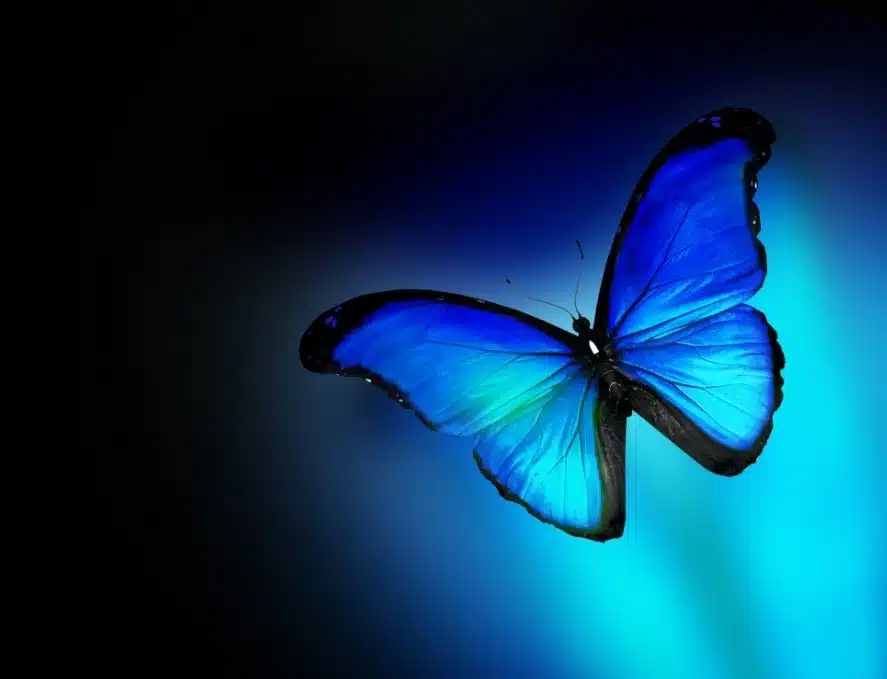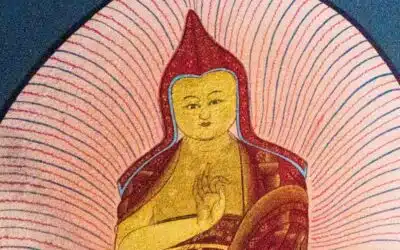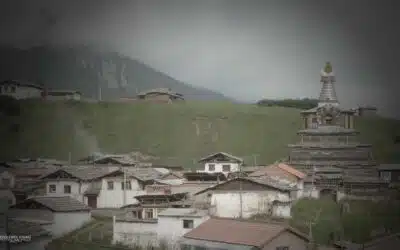The Deep End

Written By Johanne Bernard
Blog | Dzogchen practice | Mind and Dzogchen
In “the deep end”, Johanne tells us how the athlete’s sporting ordeal can be an experience of samsara and nirvana.
Series: Summer 2024
The Deep End
By the pool, the athlete gets ready. He takes off his bathrobe, adjusts his swim cap, and pulls his goggles over his face. He’s done this hundreds of times, but this time is special. It’s the big time. Family, friends and his girlfriend are there to cheer him on. They have unfurled a big banner in the stands, with his name on it. Even his coach is looking out for him.
The athlete stands in front of his swimming lane. He waits for the starting gun. His competitors do the same. It’s time to concentrate. In those seconds that seem like an eternity, his mind is caught up in all the sounds around him, as if they were amplified: his girlfriend’s voice cheering him on from the stands; the crack of his competitor’s neck a few feet away; his coach’s flip-flops on the pool deck; and the beating, beating, beating of his heart. It’s all very disturbing…
A whistle blows. The athlete dives in with a splash. As he splits the water, all sounds disappear. Only the beating of his heart remains. The athlete notices that it is beating even faster. Knock, knock. Knock, knock. Knock, knock. At least, he says to himself, he can no longer hear the outside.
“(…) in the Olympic Games of the mind, primordial nature is always first at the base. And the deep end, the one of spontaneous presence, has no beginning, and no end.”
5 meters. The athlete can still hear his heartbeat, but it’s increasingly muffled, which reassures him a little… It’s a freestyle swimming competition, so he starts with the one he’s chosen, the one he’s been training for months: the butterfly breaststroke. Inhale, pull, swing both arms forward, exhale, pull.
15 meters. A shadow passes close to him. Could it be that his rival is already overtaking him? The athlete wonders if he’s missed his start… And as he moves along in a hushed silence, it’s his thoughts that are now assailing him…
20 meters. The athlete, caught up in his thoughts, misses his pull and loses a few more meters to the shadow going beyond him… “Nothing is ever lost. Nothing is ever lost. “Concentrate”, he says to himself. Not on internal sounds, not on thoughts. Just concentrate on the movement.
30 meters. The athlete concentrates, gives his best. He is nothing but movement. Movement of the lungs, movement of the legs, movement of the arms as they strech, plunge and strech again.
40 meters. The athlete is no longer an athlete. He is a butterfly, a water butterfly that spreads its wings, dives into the inverted sky, spreads its wings again.
50 meters. The whole mind of the athlete is a butterfly. The athlete has entered what is known as flow, that state of extreme concentration, that moment when the mind is totallly focused, absorbed in an activity, when there are no more thoughts.
60 meters. There’s no butterfly, no water, no sky, no concept of distance or time. Even the idea of flow no longer exists.
70 meters. Movement is no longer movement, it’s luminosity. And every breaststroke is the dynamic of the mind. The athlete experiences what tradition calls “beyond torment” (nirvana). Out of time. Out of space. The mind returns to its base.
90 meters. A whistle blows. Distant sound, flash of light.
100 meters. The athlete’s body touches the pool deck and stops. His head comes out of the water. All the sounds suddenly come back. The athlete is still a butterfly. He doesn’t recognize his girlfriend’s voice shouting victory, or the sound of his coach’s flip-flops coming towards him… He doesn’t know where he is, or who he is… Then, little by little, he hears his heart beating. Knock, knock. Knock, knock. Knock, knock. He hears the screams. He sees the disappointed face of his opponent. He realizes that he has won. And like a sudden flood, the emotion of his victory overwhelms him… He returns to what the Dzogchen tradition calls “cyclical wandering” (samsara).
Nirvana and samsara are in fact two sides of the same coin. But to discover this, the athlete must repeat the exercise: pushing the experience of nirvana, pushing the experience of samsara, managing to separate one from the other, recognizing what is reality and what is projection. This is what is known in Dzogchen as the practice of Khordé Rushen. It’s an essential preliminary stage to realizing our true nature…
So whether we win or lose is not important, because in the Olympic Games of the mind, primordial nature is always first at the base. And the deep end, the one of spontaneous presence, has no beginning, and no end.
You can read the other articles in the series : Opening ceremony – Nenikekamen! – Hammer throw
More Posts
The Story of the First Masters: Manjushrimitra
We continue the Stories of the First Dzogchen Masters with Manjushrimitra, who structured the verses of Dzogchen into three series.
Diebu
In this article, “Diebu,” Mila Khyentse discusses the places of the lineages, particularly that of Diebu.
Be authentic!
In "Be Authentic!" Denis explores authenticity in the master-disciple relationship, a living space in which the nature of mind is recognized.




